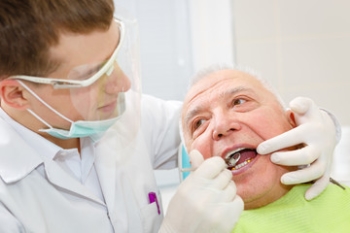Losing your teeth is not part of growing older, but for many seniors, it's a reality. For a variety of reasons, our older population is at a disproportionate risk for oral health problems. Preserving your health as you age may seem like a daunting task. However, dental health among older adults has improved in the last 50 years.
Preventative oral health is paramount to maintaining your dental health among the elderly, overall health. Although aging can make oral hygiene more difficult, there are many steps you can take to ensure proper elderly dental care.
 Resources if you need dental coverage
Resources if you need dental coverage
MedicareInterative.gov
Comman Dental Problems Among Seniors
As we age, there are many oral health problems that may plague you. Tooth loss can occur due to lack of proper dental hygiene. Diabetes and cancer are two health conditions that can contribute to poor oral health in seniors. Medications for various health problems can also cause dental problems, such as dry mouth. This condition can contribute to the development of periodontitis and cavities.
- Loss of dental coverage after retiring
- Medicare doesn't cover most dental work
- Medicaid coverage varies by state and is limited
- Can't afford out-of-pocket dental expenses
- Inadequate nutrition because of dry mouth, soreness, tooth loss
- Dry mouth from medications can lead to cavities and gun disease
- Supplemental dental coverage is limited
- Lack of transportation for regular dental visits
- Lack of access/poor care living in nursing homes
- Poor oral health can lead to serious health issues
Surgeon General Priority: Oral Health
Oral health is essential to the general health and well-being of all Americans, and it is a window into the health of the body. Oral health can show signs of nutritional deficiencies or general infection, and diseases that affect the entire body can first become apparent because of oral problems.
Many Americans who have the biggest obstacles to getting dental care continue to experience unnecessary pain and complications from poor oral health. The burden of oral disease restricts activities in school, work, and home and often significantly diminishes quality of life. Those who suffer the worst oral health are found among the poor of all ages, with poor children and poor older Americans particularly vulnerable.
Members of racial and ethnic minority groups also experience a disproportionate level of oral health problems. Individuals who are medically compromised or who have disabilities are at greater risk for oral diseases and, in turn, oral diseases further jeopardize their health.
Heart disease is a major illness for adults and seniors. Heart
disease is the number one killer of men and women. Numerous research
studies have shown a connection between heart disease and key
bacteria in periodontal disease.
Poor oral health, combined with other health factors, may contribute
to heart disease.
Bacteria on teeth and gums can travel through the bloodstream and attach to fatty plaques in the arteries. This makes the plaques become more swollen. If one of the plaques bursts and causes a blood clot to form, a person can have a heart attack or stroke. Swelling in the gums can lead to swelling in other parts of your body, including the arteries. This type of swelling can also contribute to heart disease.
There is still ongoing research about the link between heart disease
and oral health. However, maintaining good oral health may just
benefit your heart at the same time.
Unlike inherited risk factors, you can take charge of your oral
health. It is important to maintain a good oral hygiene to decrease
your risk of heart disease.
Steps
For Improving Elderly Dental Care
- Brush your teeth, at minimum, twice daily
- Regularly floss your teeth
- Replace your toothbrush at least every three months
- Visit your dentist for regular comprehensive checkups and cleanings
- If you wear dentures, make sure they fit regularly
If you're smoking-stop! Chronic dry mouth is caused by a lifetime of
smoking. Smoking makes you four times more likely to develop gum
disease. Using smokeless tobacco, cigarettes and alcohol can also
increase your risk of developing oral cancer.
One of the most serious diseases found in the mouth is oral cancer.
Often curable in its early stages, oral cancers are a major cause of
death and disfigurement in the United States, according to the
National Cancer Institute. The oral cancer screening constitutes one
of the most important components of a routine dental hygiene and
dental exam.
Guest blogger Jennifer Vishnevsky is a writer for Topdentists.com, which is a
part of EverydayHealth.com,
as well as other health and lifestyle media sites.
Related Healthy Aging Articles:
Home | About | Articles | Resources | Site Map | Privacy Policy
Elder Options of Texas
Copyright 2001-2024
All Rights Reserved
DISCLAIMER: Links to other websites or references to products, services or publications do not imply the endorsement or approval of such websites, products, services or publications by Elder Options of Texas. The determination of the need for senior care services and the choice of a facility is an extremely important decision. Please make your own independent investigation.


